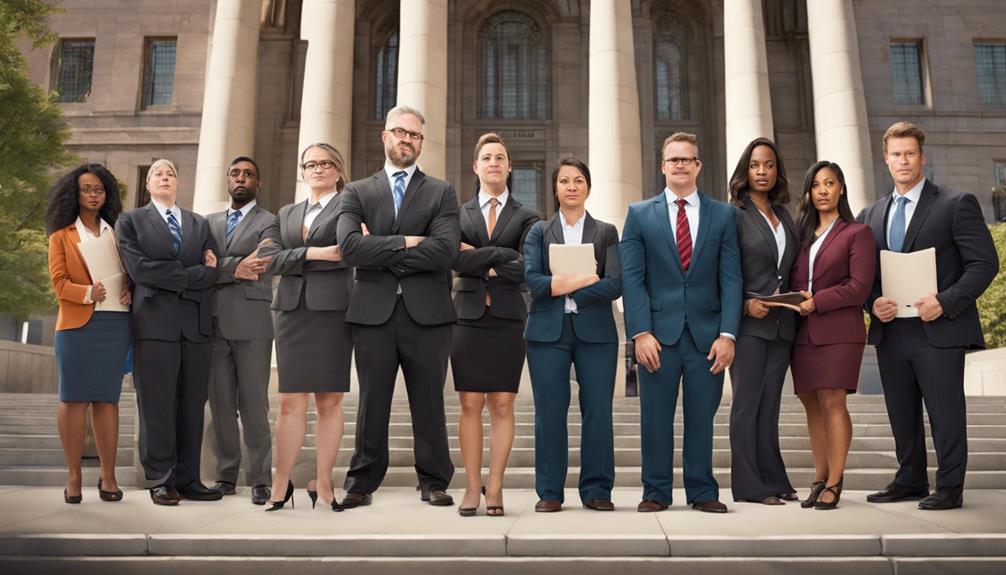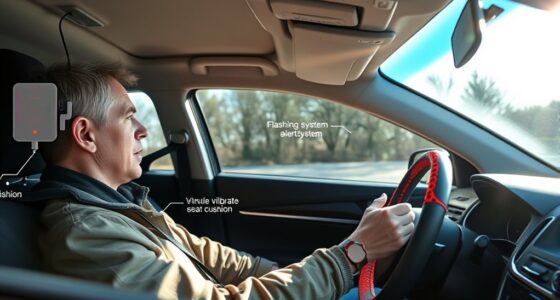In a legal landscape that is frequently characterized as a complex interplay of words, these seven deaf lawyers are demonstrating that actions carry more weight than words. Their distinctive viewpoints and legal expertise have not only questioned the existing norms but have also initiated discussions on the significance of diversity and inclusivity in the legal field.
As we explore their remarkable journeys and groundbreaking achievements, we uncover a tapestry of resilience and innovation that is reshaping the very foundation of the legal world.
Key Takeaways
- Deaf lawyers like Melissa Angelides and Haben Girma lead legal advocacy for deaf rights and accessibility.
- Innovative legal representation by deaf attorneys sets precedents for inclusivity and equality in the profession.
- Overcoming communication barriers, deaf lawyers utilize unique strategies like sign language interpreters for effective advocacy.
- By challenging biases and achieving legal milestones, deaf lawyers reshape perceptions and promote inclusivity in the legal field.
Trailblazing Career of Melissa Angelides
Melissa Angelides' journey as a deaf attorney transitioning from the courtroom to a career development office exemplifies resilience and advocacy within the legal profession. Angelides, a trailblazer in the legal field, has overcome unique challenges faced by deaf individuals in the legal profession. Her experience showcases the evolving landscape of inclusivity and diversity within the legal community. As a member of the Deaf and Hard of Hearing Bar Association (DHHBA) and having been admitted to the Bar of the United States Supreme Court, Angelides' accomplishments underscore the importance of representation for individuals with hearing disabilities.
In her trailblazing career, Angelides hasn't only found fulfillment in the law but has also become a vocal advocate for people with hearing disabilities. By actively engaging in promoting inclusivity and advocating for the rights of individuals facing similar challenges, she's paved the way for a more accessible and equitable legal profession for the deaf community. Angelides' journey serves as a beacon of inspiration for aspiring deaf lawyers navigating the legal landscape.
Overcoming Barriers in Courtroom Advocacy

We'll explore effective courtroom communication strategies and the importance of legal accommodations for deaf attorneys. Understanding the challenges faced by deaf lawyers in advocating for their clients sheds light on the necessity of inclusive practices within the legal system.
Courtroom Communication Strategies
Implementing strategic courtroom communication tactics is essential for deaf attorneys to navigate and excel in legal proceedings. Deaf lawyers overcome communication barriers in court by utilizing sign language interpreters, visual aids, and technology like real-time transcription services. They may also request accommodations such as CART services or assistive listening devices to ensure effective communication. Clear communication protocols and thorough pre-trial preparation are key strategies that help deaf attorneys in the courtroom. Additionally, written communication, gestures, and facial expressions play a crucial role in enhancing advocacy during legal proceedings. By employing these diverse communication methods, deaf lawyers can effectively convey their arguments and participate fully in the legal process.
| Communication Tactics | Description | Benefits |
|---|---|---|
| Sign Language Interpreters | Skilled professionals translating spoken language to sign language. | Facilitates direct communication. |
| Real-time Transcription | Instant transcription of spoken words into text for easy comprehension. | Enhances accessibility for all parties. |
| Visual Aids | Charts, diagrams, and images used to supplement verbal communication. | Helps in conveying complex information. |
Legal Accommodations for Deaf Attorneys
Navigating legal proceedings as a deaf attorney requires understanding and advocating for the legal accommodations necessary to ensure effective communication and access to justice. Deaf attorneys are entitled to communication access services such as qualified interpreters, CART, and assistive listening devices to facilitate interactions with deaf or hard of hearing individuals.
Unfortunately, public attorneys, including public defenders, may not always be aware of their obligations under the ADA to provide these crucial accommodations. In the private sector, some attorneys may struggle or be unwilling to offer communication access services to deaf clients, creating barriers to legal representation.
To address these challenges, the National Association of the Deaf (NAD) proposes the establishment of a communications access fund (CAF) in each state to cover the costs of communication access services with private attorneys, promoting inclusivity and equal access in the legal profession.
Policy Influence and Legal Impact
Influencing policy and leaving a lasting legal impact, deaf lawyers such as Melissa Angelides and Haben Girma are at the forefront of advocating for improved accessibility and rights for individuals with hearing disabilities. Their dedication to advancing disability rights is evident through their work, which has resulted in significant legal victories in cases related to accessibility and inclusivity. By breaking stereotypes and raising awareness in the legal field, these deaf lawyers are paving the way for a more inclusive and diverse profession. Their commitment to enhancing accessibility not only benefits individuals with hearing disabilities but also promotes a more equitable legal system for all.
3 Ways Deaf Lawyers are Making a Legal Impact:
- Leading Legal Challenges: Deaf lawyers like Melissa Angelides and Haben Girma are spearheading legal challenges that set precedents for disability rights and accessibility.
- Influencing Policy: Through their advocacy work, these lawyers are influencing policy changes that promote greater inclusivity and rights for individuals with hearing disabilities.
- Inspiring Future Generations: The achievements of deaf lawyers in the legal profession are inspiring a new generation of deaf legal professionals to continue advocating for change.
Deaf Rights Advocacy in Legal Field
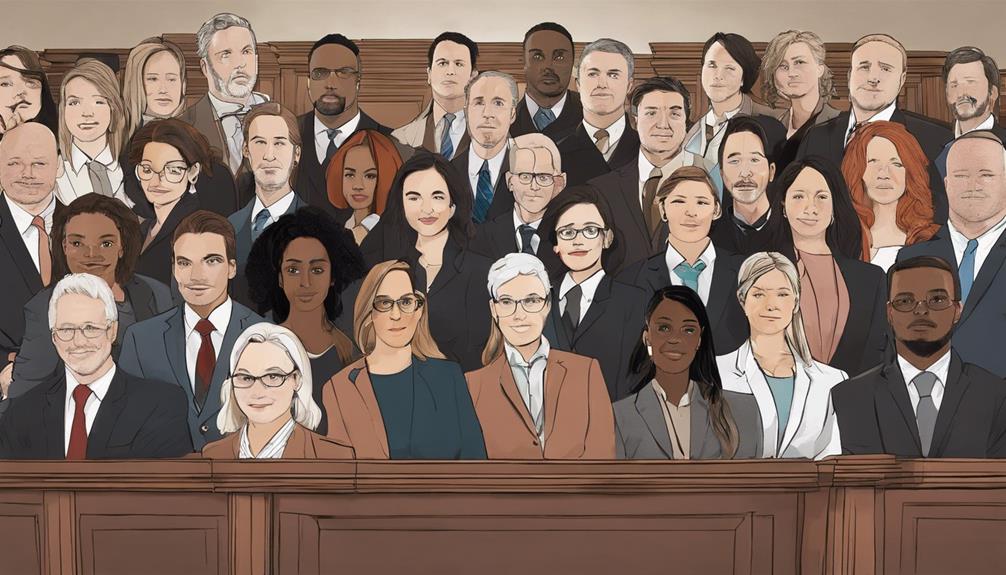
Advocating for accessibility and rights for disabled individuals in the legal field, deaf lawyers like Melissa Angelides and Haben Girma are pivotal figures in the ongoing efforts to promote inclusivity and equality. Deaf lawyers face challenges such as communication barriers, lack of accommodations, and societal doubts about their capabilities. Despite these obstacles, legal victories like National Federation of the Blind v. Scribd showcase the impact of deaf lawyers in advancing inclusivity and accessibility. Tan Ting, China's first deaf lawyer, plays a crucial role in raising legal awareness and providing support to the deaf community in China. Deaf lawyers contribute significantly to changing attitudes, highlighting their unique skills, and advocating for improved accessibility in the legal profession.
| Deaf Lawyers | Advocacy for Legal Accessibility |
|---|---|
| Melissa Angelides | Pioneering efforts in promoting inclusivity |
| Haben Girma | Leading the charge for equal rights |
| Tan Ting | Spearheading legal awareness in China |
Significant Contributions to Justice System
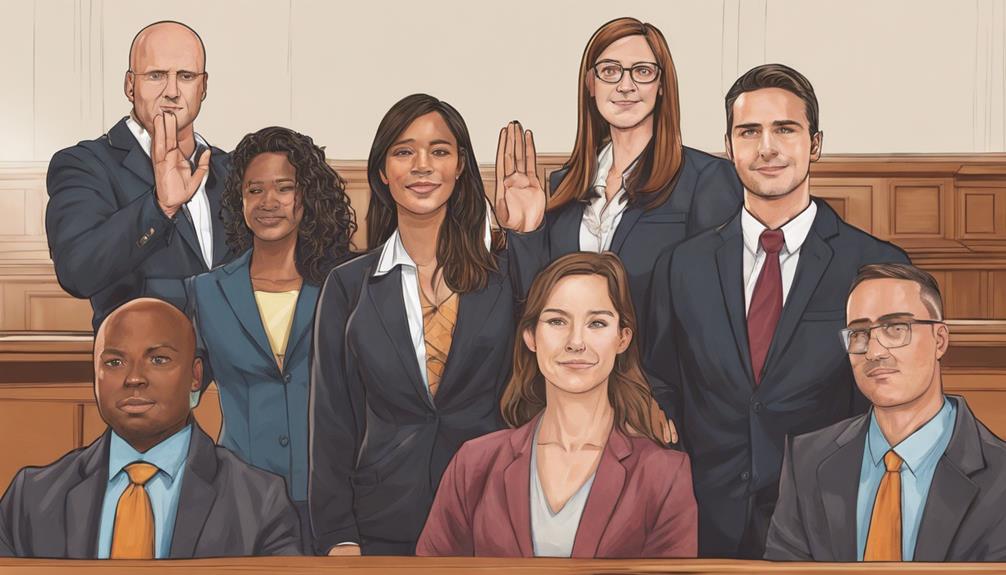
Deaf lawyers are reshaping the legal landscape by bringing unique perspectives and advocating for equal access to justice. Their impact on the legal system extends beyond individual cases, promoting inclusivity and challenging existing norms.
Through trailblazing legal representation, they're driving positive change and paving the way for a more equitable and accessible justice system.
Impact on Legal System
Deaf lawyers are revolutionizing the legal profession by championing equal rights and accessibility, thereby reshaping the landscape of the justice system. Their impact on the legal system is profound and multifaceted:
- Enhanced Access: Deaf lawyers advocate for improved access to legal services for individuals with hearing disabilities, ensuring inclusivity and representation within the legal profession.
- Breaking Stereotypes: By breaking stereotypes and paving the way for greater diversity in the justice system, deaf attorneys are challenging traditional norms and promoting a more inclusive legal environment.
- Promoting Accommodations: Deaf lawyers emphasize the importance of accommodations such as qualified interpreters and assistive devices, ensuring effective communication and advocating for a more accessible legal system.
Advocacy for Equality
The impact of their advocacy for equality reverberates throughout the legal profession, bringing about crucial changes in access and representation for individuals with disabilities. Deaf lawyers play a pivotal role in promoting the rights of individuals with disabilities, emphasizing the importance of inclusivity and accessibility within the legal system. By championing the principles of the Americans with Disabilities Act, they advocate for equal opportunities and accommodations for all. Their efforts highlight the need for improved resources and support for individuals facing legal challenges in the deaf community. Through raising awareness about the unique obstacles faced by the deaf in legal settings, these lawyers inspire a more inclusive and equitable legal landscape.
| Advocacy for Equality |
|---|
| Promotion of rights |
| Inclusivity |
| Accessibility |
Trailblazing Legal Representation
Breaking longstanding barriers, legal professionals with hearing disabilities are spearheading transformative changes within the justice system through their trailblazing contributions. Deaf lawyers are at the forefront of advocating for accessibility and rights for disabled individuals in legal matters.
Their significant contributions include:
- Innovative Legal Strategies: Deaf lawyers are pioneering new approaches to ensure equal access to legal services for individuals with hearing disabilities.
- Advocacy for Inclusivity: They're challenging stereotypes and pushing for greater inclusivity within the legal profession, creating a more diverse and welcoming environment.
- Setting a Precedent: By paving the way for a more inclusive and accessible legal sector, deaf lawyers are setting a precedent for equal representation and justice for all individuals.
Communication Challenges and Success Stories
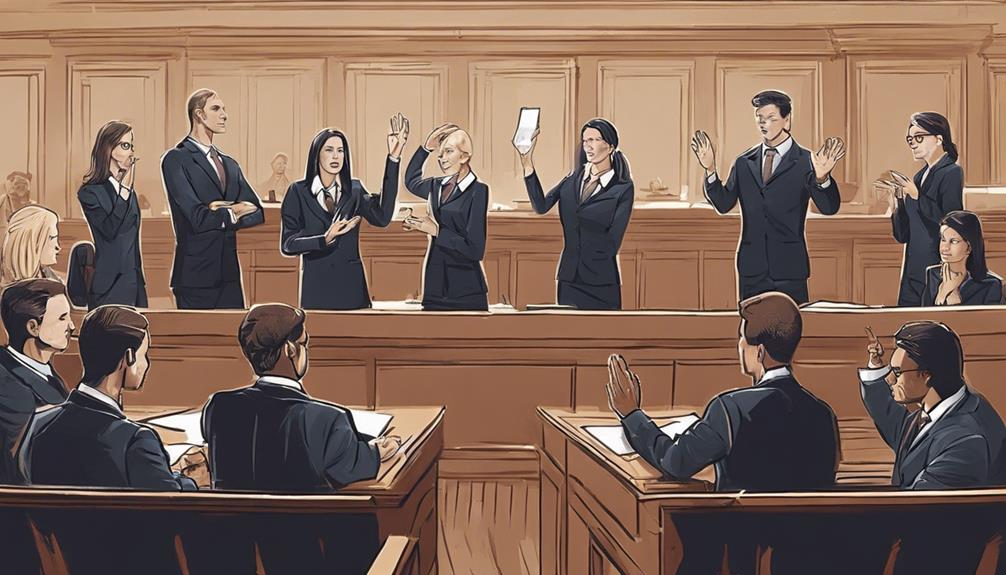
Communication challenges faced by deaf lawyers in legal settings often stem from limited access to sign language interpreters and accommodations. Without proper communication support, deaf lawyers may struggle to participate fully in discussions, understand complex legal concepts, or effectively advocate for their clients. Despite these obstacles, success stories like Melissa Angelides and Haben Girma demonstrate that with the right support and determination, deaf lawyers can overcome these challenges and excel in the legal profession.
Melissa Angelides, for example, has paved the way for other deaf lawyers by advocating for better accommodations and raising awareness about the importance of inclusivity in legal settings. Similarly, Haben Girma's groundbreaking work as a deafblind lawyer serves as an inspiration for many aspiring legal professionals facing communication barriers. These success stories highlight the resilience and talent of deaf lawyers, emphasizing the need for continued efforts to improve accessibility and support in the legal field.
Society's Biases and Legal Achievements
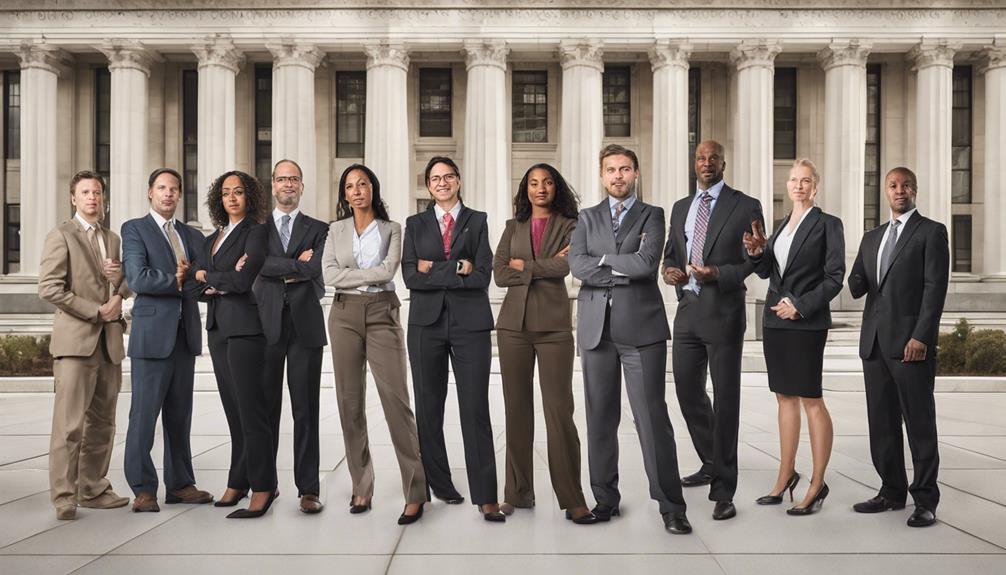
Challenging deeply ingrained prejudices, deaf lawyers like Melissa Angelides and Haben Girma are reshaping perceptions and setting new standards in the legal profession. These pioneering professionals aren't only breaking societal biases but also achieving remarkable milestones in the field of law. Their impactful contributions are evident in various aspects:
- Advocating for Disability Rights: Angelides and Girma are at the forefront of advocating for disability rights within the legal system. Their work not only benefits the deaf community but also promotes inclusivity and accessibility for individuals with disabilities at large.
- Breaking Barriers in Legal Education: By graduating from prestigious law schools, Angelides and Girma have demonstrated that deaf individuals can excel in rigorous academic environments. Their achievements serve as an inspiration for aspiring deaf lawyers and challenge traditional perceptions of what's attainable in the legal profession.
- Recognition and Symbolism: The recognition received by Angelides, including admission to the US Supreme Court Bar, symbolizes a shift towards recognizing the talents and capabilities of deaf professionals. This acknowledgment not only validates their hard work but also signifies a step towards a more inclusive and diverse legal community.
Frequently Asked Questions
How Many Deaf Lawyers Are There in the Us?
There are approximately 200 deaf lawyers in the United States. The number of deaf lawyers has been gradually increasing, contributing to diversity and inclusion in the legal profession.
Despite facing unique challenges, deaf lawyers are making significant strides in the field. Organizations like the Deaf and Hard of Hearing Bar Association provide support and advocacy for deaf lawyers in the US.
How Can Deaf Lawyers Use ADA Laws to Advocate for Deaf Clients in the Legal Profession?
Deaf lawyers can use ADA laws to advocate for deaf clients in the legal profession by familiarizing themselves with the rights and accommodations outlined in the Americans with Disabilities Act (ADA). By understanding and leveraging ADA lawyer tips for deaf individuals, legal professionals can ensure their clients have equal access to justice.
Conclusion
In conclusion, the remarkable journeys of these 7 deaf lawyers exemplify the power of determination, resilience, and advocacy in the legal field. They aren't only breaking barriers and challenging stereotypes but also shaping the future of inclusivity and accessibility in the profession.
Through their trailblazing careers, impactful contributions, and unwavering commitment to justice, these individuals are paving the way for a more diverse and equitable legal landscape. Their successes serve as a testament to the invaluable perspectives and skills that deaf professionals bring to the table.

